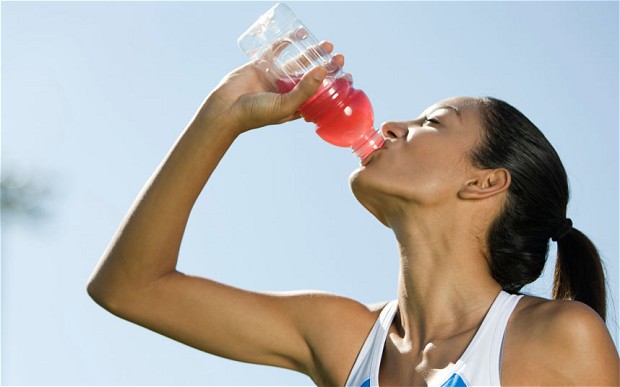Studies have continually concluded that something called carb-rinsing—basically, swishing a carbohydrate-filled liquid in your mouth and then spitting it out—can boost performance if your muscles and liver are low on energy stores. But the latest study published in Medicine & Science in Sports & Exercise goes more in-depth into how and why carb-rinsing actually works.
The overall takeaway: If you're going into a workout in a super-depleted state (read: you haven't eaten in 12-plus hours) swishing a carb-y drink around your mouth can boost your performance, even if you don't swallow it.
The new study tested eight male cyclists under different experimental conditions: One round of testing was done with the cyclists in a "fed" state, meaning they'd had breakfast at 6 a.m. then started the experiment at 8 a.m. Another round of testing was done with the cyclists in a "fasted" state (they had an 8 p.m. dinner and a 12-hour fast before the 8 a.m. experiment). The last round of testing put the cyclists in a "depleted" state; they did a 6 p.m. workout consisting of 90 minutes of high-intensity cycling and six intervals of one minute of hard riding with one minute of rest, followed by a very-low-carb dinner at 8 p.m., and then a 12-hour fast until the experiment at 8 a.m.
For the experimental trial, cyclists in each condition (fed, fasted, and depleted) completed 30 minutes of hard cycling and a 20km cycling time-trial with periodic carb-rinsing or rinsing with a placebo.
The overall results were consistent with previous studies that showed carb-rinsing was most effective when energy stores were drastically reduced. When cyclists were in a fed state, the carb-rinsing didn't have a significant effect on the time-trial times (both placebo and carb-rinse trail times were around 41 minutes). When they were in a fasted state, it had a slight benefit (placebo rinse times averaged about 43 minutes, while carb-rinse times averaged 41 minutes). And when cyclists were in a depleted state, there was a significant benefit (placebo rinse times averaged 48 minutes, while carb-rinse times averaged 44 minutes). The study also found, by monitoring the cyclists' quads with an EMG sensor, that muscle activity is reduced when they were in the depleted condition, but it was counteracted by carb-rinsing.
Why the heck does that work? Researchers believe that carb-rinsing tricks your brain into thinking more fuel is heading toward your muscles, and either convinces them to work harder or transmits signals to them more efficiently.
It's worth noting that even with carb-rinsing, the time-trial times were worse at a depleted and fasted state than in a fed state, proving that if you have the opportunity to fuel properly, you should. Also, these positive effects are only seen when your body isseriously depleted. Chances are, you're not going into a workout without having eaten in 12 hours. And, if it's available to you, it's just as easy (and better for you!) to actually swallow the sports drink if your body needs it that desperately.
However, carb-rinsing can come in handy. Other studies show that carb consumption during intense exercise can cause all sorts of GI distress, meaning swishing and spitting can be a good alternative when you're powering though a long race (like a marathon, triathlon, or lengthy cycling race) but can't stomach eating carbs from food, chews, or goos.

No comments:
Post a Comment